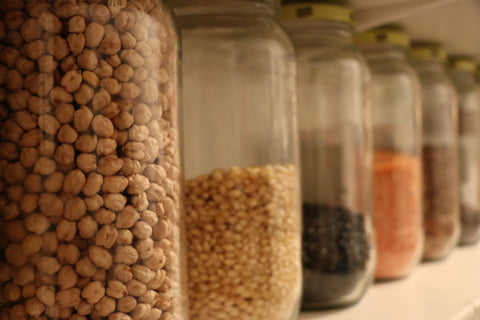
January 09, 2018 3 min read
Have you ever wondered how long whole grains last? Or how to store your whole grains? Or how to extend the shelf life or your whole grains? Today we will answer that question.

The first thing to understand is what are the environmental factors that negatively impact grains and reduce their shelf life. In our experience, roughly in order of potential impact, they are:
1) Moisture
2) Heat
3) Air
4) Critters
All four are reasonably controllable by you, but at Be Still Farms we also help keep your grains fresh and protected from moisture, air, and critters by now shipping everything in shrink-wrapped, pre-sealed, resealable bags.
Now, you may be asking "what exactly are whole grains?" You can group things that are often called "whole grains" into a couple of categories:
Whole Intact Grains: The shelf life of whole intact grains, like wheat berries or Quinoa, is longer than that of flours. If stored properly in airtight containers, intact grains will keep for 6 months and often much longer on a cool, dry pantry shelf or up to a year or much longer in a refrigerator or ideally a freezer.
Check out our organic non-GMO whole grains
Whole Grain Flours and Meals: In general, split grains (e.g. steel cut oats) and whole-grain flours spoil more quickly than intact grains, because their protective bran layer has been broken up and oxygen can reach all parts of the grain. If stored properly in airtight containers, most whole-grain flours and meals will keep for 1 to 3 months or more on a cool, dry pantry shelf and for 3 to 6 months and often much longer in the freezer.There are a couple of exceptions we have seen including Hulled Millet and Amaranth where those seem to be much more sensitive to heat and moisture (roughly twice as sensitive), so we recommend being more aggressive with your storage plan.
These are general rules of thumb, and they are pretty conservative in our experience. We often see our own grains that we store/use lasting much, much longer than what we shared above, even in less ideal environments. For example, we have one pantry that gets quite warm during the Carolina summers, even with A/C on. But we keep everything there in sealed containers, and that seems to be enough. We do always put our fresh ground wheat flour in the freezer though.
So our recommendation is always to keep your whole grains in a sealed bag or container whether you are storing them in a pantry, refrigerator, or freezer. For fresh ground flours, in particular, consider making space in your freezer for storing them and you will be rewarded with fresh-tasting flour for months and even years to come. Over time, you'll figure out what works best for you and your specific home and region. And of course, you can always ask us for more tips and ideas here at Be Still Farms by emailing us or commenting below.
Finally, here is a general set of recommendations for storing specific whole grains and related items:
Check out some of our top sellers at Be Still Farms:
Aside from our own experience at Be Still Farms, we are grateful for the following additional source info from The Whole Grains Council.
Thanks for reading this Be Still Farms Blog article. To sign up for more news/articles and/or recipes, click here. For more about us, click here. To shop our certified organic products, click here.
Please comment and share and we look forward to serving you in the future!
Comments will be approved before showing up.

January 27, 2025 3 min read
Flaxseed, the tiny yet powerful superfood, is packed with nutrients that can support weight loss. From curbing hunger to stabilizing blood sugar, this guide dives into the science of how flaxseed can help you shed those extra pounds.

December 11, 2024 3 min read
Discover three quick and easy soup recipes featuring organic small red beans. From a classic vegetable soup to a creamy potato blend, these wholesome recipes are perfect for chilly days and busy weeknights. Packed with flavor and nutrition, these soups will warm your heart and soul this winter!

December 06, 2024 3 min read
This vibrant and nutritious Green Lentil Salad combines tender lentils with grilled chicken, fresh vegetables, and a zesty lemon dressing. Packed with protein, fiber, and essential vitamins, it’s the perfect healthy meal for any time of day.
© 2026 Be Still Farms- Real, Fine Organics.
Privacy | Terms | Refund Policy | Organic Certification
